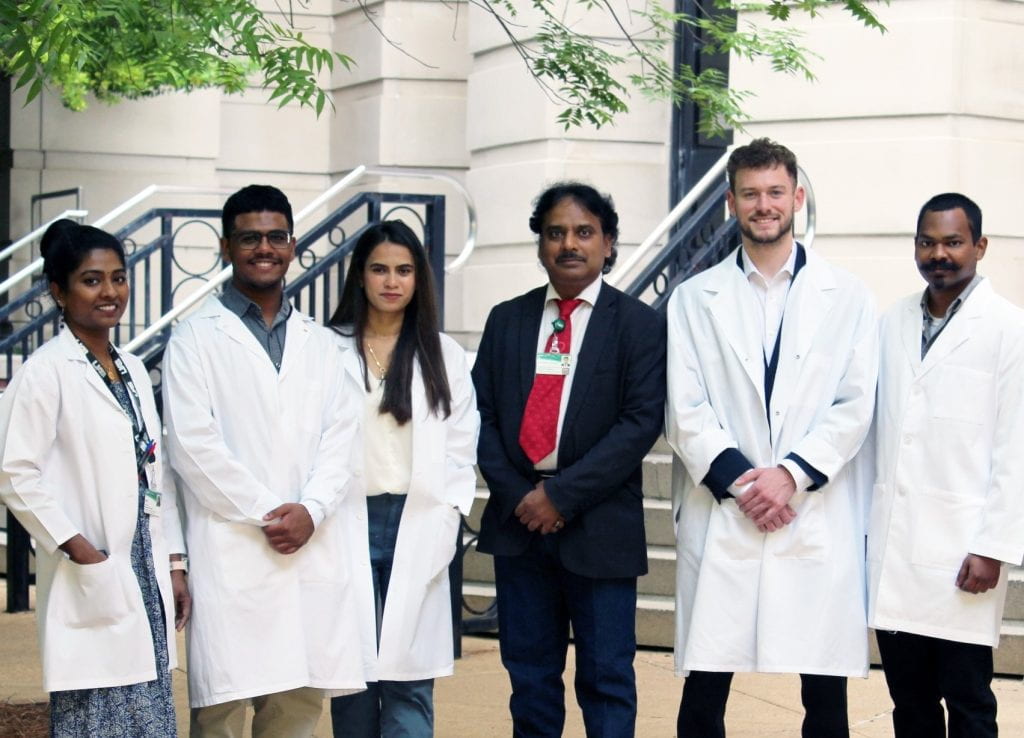Dr. NS Raja Lab

Mission Statement
Develop an in-depth understanding of mechanisms and outcomes of altered redox signaling in disease to stratify clinical patients based on oxidative/reductive milieu which leads to ascertain innovative avenues for therapeutics. Main goal is to define the redox signals in cardiovascular pathophysiology and to develop potential therapeutic measures.
We are a firm believer of the fact that “Too much of anything is not good”, boosting the biological system with too many reductants may not be a healthy fix.
Our lab is committed to a diverse, impartial and inclusive environment that drives our professional growth as an individual and the team as a whole.
Lab History
Featured in UAB News: “The protein signature changes during heart disease caused by reductive stress”
AMC21 Award to develop LMNA mutation mouse models to study heart disease
Associate Professor: Tenured
Featured in UAB News: “Reductive stress in neuroblastoma cells induces protein aggregates and impairs neurogenesis”
Key Publications in Reductive Stress mechanisms in heart, skeletal muscle and brain
“Reductive Stress Causes Pathological Cardiac Remodeling and Diastolic Dysfunction. Antioxid Redox Signal” (Rajasekaran NS et. al) “Reductive stress impairs myogenic differentiation” (Rajasekaran NS et. al) “Reductive stress promotes protein aggregation and impairs neurogenesis” (Rajasekaran NS et. al)
RO1- Supplemental Grant Award: RS in heart-brain axis
From NIH National Institute on Aging
First Ph.D. graduate from laboratory at UAB
Justin M. Quiles
Featured in UAB News: “Identifying a subgroup of heart failure patients could lead to improved care”
NIH RO1 Renewal at UAB: RS in proteotoxic cardiac diseases (Translational) in collaboration with PSG Institute of Medical Sciences and Research (PSG IMSR) Coimbatore, Tamil Nadu, India
First Lab NIH-RO1: RS in proteotoxic cardiac diseases (RS Models and Cardiac Pathophysiology)
First Lab Research Article
“Sustained activation of nuclear erythroid 2-related factor 2/antioxidant response element signaling promotes reductive stress in the human mutant protein aggregation cardiomyopathy in mice” (Rajasekaran NS et. al)
Assistant Professor NIA-RO3 to study the effect of Nrf2 signaling on aging
Research Instructor AHA-Beginning Grant to study Nrf2 signaling in human mutant protein aggregation in cardiac disease
Groundbreaking Discovery
“Reductive Stress (RS) in human heart disease”
Postdoctoral Fellow in Dr. Ivor Benjamin Lab at the Division of Cardiovascular Medicine- University of Utah
Indian Institute of Technology Madras Department of Biotechnology Government of India Postdoctoral Fellow #1
Redox mechanisms in diabetes and tissue degeneration
University of Madras Graduation
Mechanisms of LDL Oxidation during Cancer Therapy

